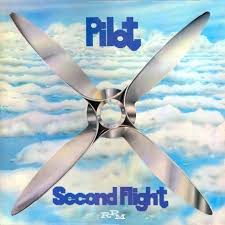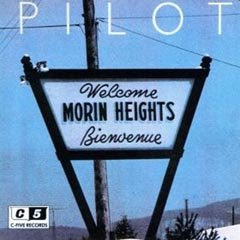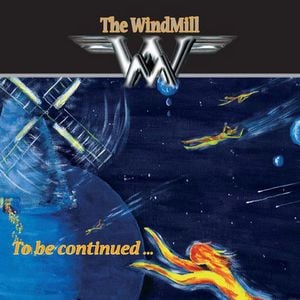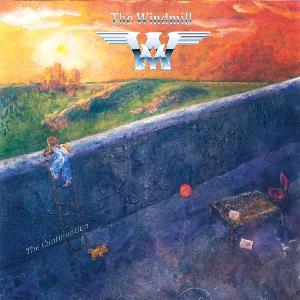
Just as there are thousands of bands and artistes who made it, there are at least probably ten times that many who didn't, or who had one success and then faded away, the almost proverbial one-hit-wonders. In this section I want to pay tribute to some of these bands and artistes, many of whom I listened to when growing up, some of whom had the odd hit single but most of whom either disbanded early or stumbled on through a career not exactly glittering with success, to end up in the one-ninety-nine bargain bin or the second-hand record shelf.
 Pilot (1973-1978)
Pilot (1973-1978)
Yeah, in case you couldn't guess from the unfeasibly wide flares in the above picture, this band plied their short trade in the seventies. Surprisingly enough, Pilot had some notable members: Ian Bairnson and David Paton would later go on to work with the Alan Parsons Project, while Stuart Tosh, in addition to joining the APP would also be part of 10cc. Paton and Billy Lyall, founders of the band, had both previously been in teenybopper sensation The Bay City Rollers. Pilot were formed in Glasgow in 1973 and hit their first major success with the single "Magic", which almost gave them a top ten hit, though it did considerably better in the US, where it hit the number five slot. Canada, however, was where the single enjoyed its best success, climbing right to the very top of the charts.
Over their relatively short career Pilot released four albums, with the final one being re-recorded in 2002 when Bairnson and Paton resurrected the band, and put out under a new name, "Blue yonder", with a few extra tracks and one or two left off the original, which had been titled "Two's a crowd", to reflect the fact that by the time they got around to recording it the rest of Pilot had moved on, and only the duo were left to do the album.
As I'm already working on several large projects at the moment, I don't intend to write in-depth reviews of these albums, but I do want to listen to them all, or all that I can track down: some of these bands are very obscure, and finding their material ---- in some cases, any of it --- may prove challenging. But with Spotify, Grooveshark and of course YouTube to help me, I hope to be able to examine a reasonable crosssection of each artiste's work. The reviews will be very short, just an impression really, unless something really strikes me. Think the Batlord crossed with Urban and you'll get some sort of idea about the style of thing I'm aiming for. Actually, don't think of that: put that image out of your mind before you have nightmares! But you get the idea, I hope. So anyway, on with Pilot, the first band I want to check out.
From the album of the same name (1974)

Okay, before we begin, bear in mind this is not rock. This is seventies, softcore, watered-down MOR music, the sort of thing that would be guaranteed to be played on the radio. Inoffensive, unimaginative, parent-friendly music that even so managed to be catchy and singable. The lyrics were okay but nothing special and even having the likes of future APP and 10cc alumni in Pilot did not in any way make them a rock band. We're not treading in Unknown Soldier territory here, despite the seventies setting. This was the kind of music you would hear on "Top of the Pops" but hardly "The Old Grey Whistle Test", and hardcore religious evangelists would have little if anything to complain about. If one word described Pilot's music, it would have to be "safe".
At least, that's the conclusion I've come to after painstaking research involving their only hit singles. Perhaps I'm wrong and this music has a harder edge than I expect it to, but if so I will be quite surprised. Let's see if I get quite surprised.
Well the opening did kind of take me by surprise with a big guitar intro, but it quickly settled into Air Supply/Bread territory, and although it's nice to hear the voice I've always associated with the Alan Parsons Project, it's not a huge jolt, and the annoying handclaps are, well, annoying. Nice song with a catchy hook, and indeed one of their not so successful singles from the album, "Just a smile" is a decent starter, but it's only when the big hit gets going that things get a bit more interesting. Almost synthpop before synths were much in vogue, but again it has a great hook and a sort of snarly guitar in it reminiscent of the likes of the Kinks, this mostly due to Bairnson, who only features on this and one other track, having joined the band late. The guitar on the rest of the songs is supplied by Paton, with Billy Lyall handling the perky keyboards, some vocals and the odd flute. Nice acoustic strummed guitar and lazy piano opening a kind of lurching "Lucky for some", where we get to hear Lyall's rather nice flute (oo-eer missus!) for the first time and it certainly adds something to the song. Kind of a country, folky feel to it, quite relaxed really.
"Girl next door" sounds totally Supertramp, with an uptempo piano leading the melody, though I can of course hear elements that would slide into the work of the APP later, especially the bassline and the crooned backing vocals. Trumpet from David Mason is another touch the APP would work into many of their songs, albeit that would be on synth whereas here it's the real thing. "Lovely lady smile", the first ballad, is pure James Taylor while "Sooner or later", despite the fact that Alan Parsons would use the title in a later album, is uptempo but pretty forgettable really. Nice jangly piano, again touches of Supertramp and also little hints of Genesis at times. Speaking of that jangly piano, it's getting a bit overdone: here it is again taking command in "Don't speak loudly". Again I can hear the style that would become that of the APP evolving here, but by "Over the moon" I'm distinctly not, and I'm getting more than a little bored. I can see how anyone buying this album on the strength of the hit single would probably have felt a little let down, as that's the definite highlight.
Nice use of the trumpet again on that track, but the similarities to what would become the APP are becoming not only more evident but a little annoying. Not that you can blame Pilot for that, but it does sort of feel like I'm listening to one of Parsons's early efforts. Bit of semi-sleazy rock in "Never give up", but the chorus devolves into a generic pop one with overtones of the Beatles, while again Supertramp influences are all over "High into the sky", and even the second and last contribution from Ian Bairnson can't save this annoying happy-clappy piece of ... ahem, anyway, on we go to "Auntie Iris", and with a title like that I'm not expecting much, and I'm not wrong. Kind of like having your brains bashed out with a large bunch of flowers while someone forcefeeds you camomile tea. What is the point of the song? Thankfully it's very short (though not short enough) but then I'm just totally unexpectedly blown away to hear the closer, "Sky blue", and realise that Bairnson took the opening guitar riff in its entireity for Alan Parsons' solo "On air" album, for the song, wait for it, "Blue blue sky"! Even the keyboard part is the same! Man: twenty years before that album was released and he had that riff. You have to give him respect for that.
But overall, though this is a powerful and fitting closer, the title fitting in with the band's name, I find this a pretty weak album, although to be honest I wasn't expecting to be that impressed anyway. And I apologise: this review, such as it is, was nothing like Batlord and Urban, combined or separate: either or both of them would probably kick my arse and call me a pussy. Yeah, I find it hard to keep things short; just look at some of the reviews in "Bitesize"! Oh well.
TRACKLISTING
1. Just a smile
2. Magic
3. Lucky for some
4. Girl next door
5. Lovely lady smile
6. Sooner or later
7. Don't speak loudly
8. Over the moon
9. Never give up
10. High into the sky
11. Auntie Iris
12. Sky blue
Second Flight (1975)

Oh dear! This starts with a squeaky, friendly keyboard arpeggio and more Beatles/Supertramp style, pretty throwaway really as "You're my number 1" does not inspire confidence, with "Love is" another soppy love song which is pretty much the opener just slowed down. Well, that's not fair, but it's quite similar. Man, this is sickly sweet: think my teeth are beginning to hurt. Oh there's some decent guitar to soothe me. That bouncy piano is driving me mad. Oh no, the guitar's gone now. Sigh. Seems David Paton wrote both of these solo; I know he can write better but these are definitely not his finest hour. Much better is the slightly rockier "Call me round", which I think was a single, though information on Pilot is pretty hard to come across after their first album. This is also the first song on the album where Ian Bairnson joins in on the writing, and it really shows. Very commercial certainly, but nowhere near as cloying as the first two tracks. I also realise I know this song, which is why I think it may have been a single. Let me check: yeah, it was. Just fell short of the top thirty too. No wonder I recognise it. Decent song.
"55 degrees north by 3 degrees west" is the first track without any input from Paton, it's Billy Lyall and Bairnson collaborating and in fact it's Pilot's first instrumental. Not bad, but it sounds like the theme to some seventies cop show or lawyer show. Nice display by Bairnson on the guitar and even the squeaky, almost hysterical keyboard of Lyall is not too annoying. But it is annoying. Paton's back on his own then for two songs in the middle of which Lyall writes his own. The first Paton number is a nice little acoustic ballad called "To you alone", very lounge music really, with a certain Spanish tint to the percussion, while "Do me good" is Lyall's first of four solo compositions on the album, a heavier song, in the very broadest sense of the word. Nice guitar solo raises it almost to the status of rock, though not quite, then Paton's next contribution is "Heard it all before", which is beginning to become something of a motif with this album. And indeed I have; it's quite similar to a few songs on the debut album, though it has some nice sort of talkbox or vocoder or some sort of effect on it that at least gives the song some needed punch.
And on it goes. "Bad to me" is an uptempo APP style song which is enjoyable on one level but a little empty on others, while "You're devotion" goes back more or less to the feel of the first two tracks, though there is a squealing, rockish guitar in there. Mind you, for all I've put Paton down, it has to be admitted that it was he who wrote their big hit single. "January", up next, took them to number one and so is their best known track and the one for which they will probably be tagged as one-hit-wonders. It's a fast, poppy song with a great hook, quite simple as many of the top hits are, but it's clearly in a class of its own here, as nothing else touches it. Also has another cool guitar solo in it and a sweet riff running right though it. Why didn't they write more songs like this? Even the handclaps don't bug me, and they usually do.
However what does bug me is the awful, awful "Passion piece", which has no passion I can see, other than a passion it should be over. Bloody flute! And twenties style music too. Not to mention Billy Lyall, in addition to writing it, decides to sing it too. God how I hate this! The album finally comes to an end with "Dear artist", another Lyall effort but miles better, a nice piano ballad which does its best to make you forget "Passion piece", and mostly succeeds. At least Paton manages to wrest the mike from his grasp: don't let that man sing again, please!
TRACKLISTING
1. You're my number 1
2. Love is
3. Call me round
4. 55 degrees north by 3 degrees west
5. To you alone
6. Do me good
7. Heard it all before
8. Bad to me
9. You're devotion
10. January
11. Passion piece
12. Dear artist
Morin Heights (1975)

You certainly can't fault this band for their output. Two albums in 1975 and their next hits the shelves the following year. It has a certain funk element in it as it opens on "Hold on", the tracks much shorter with only one over four minutes and a few barely over two. "Canada" has that by now familiar sort of marching piano and funky bass with trumpeting keys (or maybe they're real trumpets) and a guitar passage that would crop up later on APP albums like "Pyramid" and "Stereotomy", and "First after me" is a little grittier, with the guitar taking control mostly. "Steps" then is a nice ballad, built on a soft jangly guitar and some nice vocal harmonies. Actually sounds rather a lot like "Gemini" off the "Eye in the sky" album.
More of a rocker then is "Mover", and though I can't confirm this I think it might be Billy Lyall singing here; certainly doesn't sound like Paton. The excessive reverb on it though gets on my nerves, and I don't consider it that great a song to begin with. "Penny in my pocket" is a little better, though not much to be fair; it's all pretty mediocre as far as these ears are concerned. Great guitar solo all right. "Lies and lies" has a heavy piano line leading it and is more uptempo, tending sort of towards the rock end of the spectrum and with a powerful vocal from David Paton. Piano too leads "Running water", the first song on the album to make any impression upon me. A lovely slow sensual ballad with real promise, kind of puts me in mind of ELO, and of course APP; precursor to "Time" perhaps?
"Trembling" is another ballad but owes a lot to Floyd's "Any colour you like" --- well, Alan Parsons did work on "Dark side of the moon", and I think he may have produced this album, though perhaps not. Nevertheless, the similarities are impossible to ignore; they almost took parts of the guitar melody directly from the piece. "Maniac (come back)" then takes things up several notches with an uptempo bopper with some more great guitar from Bairnson, and the album closes on "Too many hopes", one more ballad very much in the Alan Parsons mode. I don't know: maybe this would have been a better album if they had spread out the ballads over it instead of bunching them all up in one --- oh hold on. The closer just got a bit more punchy in the chorus. So it's one of those songs that once again doesn't know and can't decide what it wants to be. Says it all about this band really.
TRACKLISTING
1. Hold on
2. Canada
3. First after me
4. Steps
5. The mover
6. Penny in my pocket
7. Lies and lies
8. Running water
9. Trembling
10. Maniac (come back)
11. Too many hopes
Two's a crowd (1977)

There's something of a slightly more orchestral arrangement to the opener on what would be Pilot's last album, and the sound that would become that of the Alan Parsons Project continues to evolve on "Get up and go", with a nice solo from Ian Bairnson and a boppy uptempo happy feel to it; quite good actually. Bily Lyall had by now left the band, so it was basically the core of Bairnson and Paton, and to be honest it shows. Second track, "Library door" is a nice sort of acoustic ballad driven on what sounds like a nice soft accordion (may be keys of course) and contains one of those riffs that was to become the signature sound of the APP. Recorded at the famous Abbey Road Studios and with Alan Parsons in the producer's chair, it's already sounding like Pilot's best album. Mind you, "Creeping round midnight" is more like something off the last album, or the one before that: boppy pop tune with a squidgy bass line but a bit lacking somehow.
"One good reason why", a song whose title would be used on a later APP album, is another lovely ballad, while "There's a place" is pure seventies slow disco really, very generic, kind of David Cassidyesque, which is not to say I don't like it but I could live without it. Ditto "The other side"; it's okay but a bit lightweight. Yes I know we're talking about Pilot, but still. Another nice ballad in "Monday Tuesday", very Bread in nature, with again some gorgeous orchestration. "Ten feet tall" is like something off Sergeant Pepper's but showcases the occasionally manic voice Paton would use on the odd APP track later, and it has an interesting almost tuba-like sound on it.
There's quite a progressive feel to "Evil eye", and you can really feel the APP sound just really taking over now: it's almost eighty percent a Parsons album at this point, with "Mr Do or Die" proving the point with a very familiar bassline and melody, despite the innate funkiness of it. Kind of more like the stuff Alan attempted solo in the nineties really. The album then ends on "Big screen kill", with a big rolling drum into and slide guitar, a final ballad to close the final Pilot album.
TRACKLISTING
1. Get up and go
2. Library door
3. Creeping around midnight
4. One good reason why
5. There's a place
6. The other side
7. Monday Tuesday
8. Ten feet tall
9. Evil eye
10. Mr. Do or Die
11. Big screen kill
So that's Pilot, a band who had two big hits in the mid seventies then disbanded, but each in their own way went on to find fame, apart from poor Billy Lyall, whose singing I so slagged off, who succumbed to an AIDS-releated illness and died in 1989. I'm not really sure why Paton and Bairnson decided to re-record this last album again, twenty-five years later, but they did and it was retitled "Blue yonder" (more imagery that would find its way into Alan Parsons's second solo album), I guess symbolising that Pilot the band had gone to that great aircraft graveyard in the sky. I wouldn't say they were integral to the seventies pop music scene, but then, without them we might not have had the distinctive sounds of the Alan Parsons Project, to say nothing of 10cc. From such small beginnings, eh?
Next time I'll be looking at another British pop band who had one big hit, but who recorded six albums, a bunch of lads called Jigsaw.





















 Linear Mode
Linear Mode
